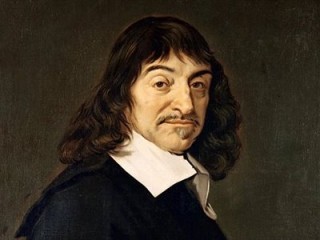
René Descartes(En.) biography
Date of birth : 1596-03-31
Date of death : 1650-02-11
Birthplace : La Haye, Touraine, France
Nationality : French
Category : Famous Figures
Last modified : 2010-05-27
Credited as : Philosopher and mathematician, Cartesian coordinate system, Analytic geometry
Descartes frequently sets his views apart from those of his predecessors. In the opening section of the Passions of the Soul, a treatise on the Early Modern version of what are now commonly called emotions, Descartes goes so far as to assert that he will write on this topic "as if no one had written on these matters before". Many elements of his philosophy have precedents in late Aristotelianism, the revived Stoicism of the 16th century, or in earlier philosophers like St. Augustine. In his natural philosophy, he differs from the Schools on two major points: First, he rejects the analysis of corporeal substance into matter and form; second, he rejects any appeal to ends—divine or natural—in explaining natural phenomena. In his theology, he insists on the absolute freedom of God’s act of creation.
Descartes was a major figure in 17th-century continental rationalism, later advocated by Baruch Spinoza and Gottfried Leibniz, and opposed by the empiricist school of thought consisting of Hobbes, Locke, Berkeley, Jean-Jacques Rousseau, and Hume. Leibniz, Spinoza and Descartes were all well versed in mathematics as well as philosophy, and Descartes and Leibniz contributed greatly to science as well. As the inventor of the Cartesian coordinate system, Descartes founded analytic geometry, the bridge between algebra and geometry, crucial to the discovery of infinitesimal calculus and analysis. He is best known for the philosophical statement "Cogito ergo sum" (French: Je pense, donc je suis; English: I think, therefore I am; or I am thinking, therefore I exist), found in part IV of Discourse on the Method (1637 - written in French but with inclusion of "Cogito ergo sum") and §7 of part I of Principles of Philosophy (1644 - written in Latin).
Most famous for his creation of Cartesian geometry, René Descartes was a philosopher, mathematician, and a scientist. He is regarded as one of the world’s premier thinkers to set the standard for modern scientific reasoning. Using the world as his book at a young age, he decided to learn about the world through his travels and interactions with his fellow man. His writings would later get him into trouble from religious and political bodies, but his legacy lives on in many academic fields today.
Born to a well-connected family in France, his mother died when he was young and his father was a judge in the High Court. He received a solid education at a Jesuit College, then studied at the University of Poitiers, where he earned a degree in law, but never went on to become a lawyer. Instead, he wanted to explore the world, travel, and seek a truth that academia could not provide. An autobiography of René Descartes and his travels was later published and called “…Seeking the Truth in the Sciences”.
After his “studies” abroad, Descartes returned to Paris and then frequented other regions of Western Europe, but not before selling all his land and investing the money that would give him enough to live on for the rest of his life. His work in the natural sciences was just beginning and appeared in his work the Meditations on FirstPhilosophy, which helped set a precedent for scientific reasoning.
Although René Descartes is famous for his theories on existing, namely as reflected in the famous phrase, “I think, therefore I am”, which displays his conclusions that humans are different than animals only in regard to rational thought. However, this rationale can be overthrown in moments of emotion – such as seen in passion, vengeance, or even fondness for another.
René Descartes continued publishing books and papers about his theories in Europe. His work became known as Cartesian philosophy and was banned throughout Europe. After receiving a stipend from the King of France to continue his writings, Descartes came up with Cartesian geometry, or plane geometry, that can be coordinated on a two dimensional plane – namely on graph paper. Descartes died in 1650 in Sweden from what history records officially as pneumonia, but what some scholars believe was arsenic poisoning.
















